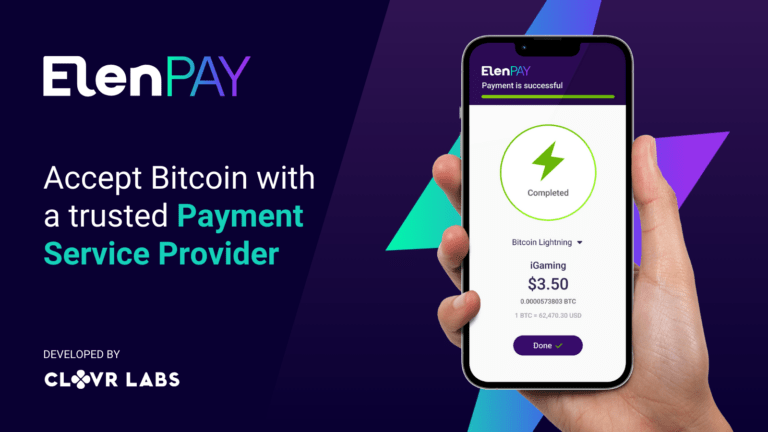
Bitcoin utility for businesses lies in its ability to reduce costs, speed up transactions, and open access to new markets. By addressing inherent problems in traditional finance—such as high fees, slow cross-border payments, and centralization—Bitcoin offers a decentralized payment solution that’s both innovative and practical.
With tools like Bitcoin Lightning and trusted PSPs such as ElenPAY, businesses can seamlessly integrate Bitcoin into their operations, enhancing efficiency and customer satisfaction.

Understanding Bitcoin Utility
From its humble beginnings as a niche idea to its current status as a globally recognized financial innovation, Bitcoin has transformed the way people think about money and value.
While some view it as a hedge against inflation or a way to preserve wealth, others see it as a foundation for creating new financial tools. Yet, for many, the real potential of Bitcoin remains unclear—especially when it comes to its utility for businesses. To truly understand its benefits, we first need to explore its origins and purpose.
Who Invented Bitcoin and Why
Bitcoin was invented by an anonymous figure or group known as Satoshi Nakamoto, who introduced it to the world on October 31, 2008, through a white paper titled “Bitcoin: A Peer-to-Peer Electronic Cash System.” The paper outlined Bitcoin as a decentralized digital currency designed to operate without banks or governments.
Launched during the 2008 financial crisis, Bitcoin was meant to offer an alternative to traditional financial systems—giving individuals more control over their money and enabling secure, low-cost transactions without intermediaries. Its limited supply of 21 million coins ensures scarcity, while blockchain technology guarantees transparency and security in every transaction.
By eliminating the need for centralized authorities, Bitcoin opened the door to a new financial era, redefining how people think about money and trust in the digital age.
How Does Bitcoin Work?
Bitcoin operates on innovative technology that ensures secure, transparent, and decentralized transactions. Here’s a breakdown of the key components:
Blockchain Technology
At the heart of Bitcoin is the blockchain—a public, distributed ledger that:
- Records every Bitcoin transaction in a secure, transparent way.
- Creates a permanent and tamper-resistant history of all transactions.
- Uses cryptography to verify and secure each transaction.
- Automatically adjust the system to keep the network running smoothly and ensure steady transaction processing.
Bitcoin Mining
Bitcoin mining is essential for keeping the network running. Here’s how it works:
- Miners group verified transactions into “blocks.”
- They compete to solve complex cryptographic puzzles using a validation process called Proof of Work.
- The first miner who solves the puzzle can add a new block to the blockchain.
- Miners are rewarded with Bitcoin for their efforts, encouraging them to secure the network.
Transaction Process
The transaction process in Bitcoin is easy and secure, but it requires a few basic tools and steps:
- Both the sender and the recipient need a digital wallet to store Bitcoin. Wallets generate unique addresses that act like account numbers for transactions.
- The sender specifies the recipient’s wallet address and the amount of Bitcoin to transfer, using their private key to digitally sign the transaction, proving ownership of the Bitcoin being sent.
- The signed transaction is broadcast to the Bitcoin network, where it becomes visible to miners.
- Miners verify that the transaction is valid and include it in a new block added to the blockchain. This process ensures the transfer is secure and irreversible.
- Once the transaction is confirmed on the blockchain, the recipient’s wallet is credited with the Bitcoin.
Bitcoin Lightning
Bitcoin Lightning is a second-layer solution designed to improve Bitcoin’s scalability, functionality, and efficiency, making it more suitable for businesses. It allows them to:
- Create private payment channels to process transactions quickly and at lower costs.
- Process micropayments without congesting the main blockchain.
- Reduce transaction fees significantly, making Bitcoin more practical for everyday use.
What Problems Is Bitcoin Trying to Solve?
Bitcoin addresses several key issues in the traditional financial system:
- CENTRALIZATION AND CONTROL: By eliminating the need for banks or governments to manage transactions, Bitcoin reduces dependency on centralized authorities and minimizes the risks of system-wide failures.
- FINANCIAL INCLUSION: Bitcoin provides unbanked populations with access to financial services, enabling them to participate in the global economy without needing a traditional bank account.
- HIGH TRANSACTION COSTS: Bitcoin, when used through the Lightning Network, is especially cost-effective for international payments.
- SLOW CROSS-BORDER TRANSFERS: Bitcoin enables faster processing of global transactions compared to traditional methods, which can take days.
- PRIVACY AND SECURITY: While not completely anonymous, Bitcoin offers more privacy than traditional banking. Its cryptographic design also enhances security against fraud, chargebacks, and hacking.
- INFLATION PROTECTION: With a fixed supply of 21 million coins, Bitcoin acts as a hedge against inflation and protects against the risks of excessive monetary policies tied to fiat currencies.
How Does Bitcoin Help Businesses?
Considering the problems that it solves, Bitcoin utility for businesses provides several advantages, helping them streamline operations and drive growth:
- Lower Transaction Fees: Bitcoin payments operated through the Lightning Network have lower fees than traditional methods, reducing costs for businesses, especially those handling high transaction volumes.
- Protection Against Fraud: Bitcoin transactions are irreversible, eliminating chargebacks and minimizing fraud-related expenses.
- Fast International Payments: Cross-border transactions with Bitcoin are quick and bypass the delays and fees of traditional international transfers, benefiting businesses with global operations.
- Expanded Payment Options: Accepting Bitcoin adds a modern payment method, appealing to tech-savvy and younger customers, broadening the business’s reach.
- Access to New Markets: Businesses can tap into unbanked populations and cryptocurrency users who prefer paying with Bitcoin.
- Opportunities for Innovation: Adopting Bitcoin encourages businesses to explore blockchain technology, preparing them for future developments like central bank digital currencies (CBDCs).

Use a Trusted Bitcoin Lightning PSP
Setting up Bitcoin payments for your business can be straightforward with the right tools and partners. Partnering with the right Bitcoin Payment Service Provider is essential for businesses looking to accept Bitcoin seamlessly and securely.
As a reliable Bitcoin Lightning PSP, ElenPAY is committed to providing customized solutions for the iGaming sector and other industries demanding innovative payment solutions.
Here’s why ElenPAY is the ideal partner for your business:
- Instant Bitcoin-to-Fiat Conversion: Avoid price volatility with real-time conversion.
- Faster Transactions: Near-instant payments via Bitcoin Lightning with minimal fees.
- Regulatory Compliance: Fully compliant with AML and KYC standards.
- Scalable Solutions: Flexible integrations for e-commerce, SaaS, and more.
- Easy Integration: User-friendly tools and APIs for seamless setup.
- Dedicated Support: Expert guidance to optimize payment workflows.
With ElenPAY, you can confidently accept Bitcoin and focus on growing your business.
Interested in learning more? Contact us today for a personalized demo and discover how ElenPAY can transform your payment strategy.
Bitcoin Utility FAQs
Bitcoin helps businesses by reducing payment processing costs, enabling fast cross-border transactions, and expanding access to global markets. For individuals, it provides financial sovereignty, secure transactions, and a way to hedge against inflation.
The biggest problem with Bitcoin is the slow transaction speeds and high fees. However, Bitcoin Lightning solves these issues by enabling faster, cheaper transactions, making Bitcoin more practical for everyday use.
Bitcoin solves the double-spend problem through the use of blockchain and a Proof-of-Work system. This ensures that every transaction is verified and recorded, preventing the same Bitcoin from being spent twice.
Yes! With innovations like Bitcoin Lightning, growing adoption by businesses and corporations, and increasing regulatory frameworks, Bitcoin’s utility and relevance continue to expand, positioning it as a key player in the future of digital finance.
Leave a Reply